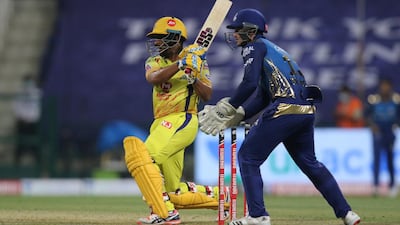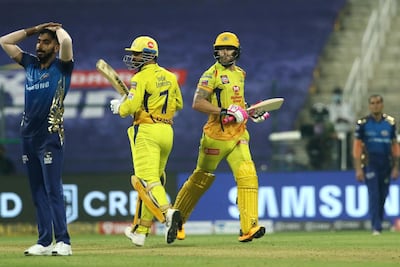It was Cricketainment. But not as we know it.
Yes, it was lively. The ambient noise on the television broadcast was racier than the soundtrack that had been used in the previous lockdown cricket, that being the English summer, that’s for sure.
Not that it was an exact match for the raucousness of 33,000 crammed into the Wankhede Stadium.
Even the cheerleaders showed up every so often. Albeit as pre-recorded images on the 14ft LED screens that ran the length of the midwicket boundaries.
The stadium, decked out in IPL bunting, looked a picture. Few grounds can lend themselves to still looking good when there is nobody there as the futuristic Zayed Cricket Stadium does.
Whatever it looked like on the TV, after a seven-month delay, IPL’s supporters were ready for this.
Even then, they were made to wait just a little longer. The start was delayed briefly because of a fault with the sightscreen, with the sponsors’ logo refusing to vanish.
It felt apt that the sponsors – late comers to this season’s party – should get a little extra airtime. It would not be the IPL without a large concession to commerce.
Then finally we got some cricket. And how classical it seemed, Rohit Sharma essaying a sweet cover drive for four off the first ball of the season, a swinging half volley from Deepak Chahar.
Judged in isolation, it looked as though the Hitman had never been away. There were a few clues that he had, though.
The side-profile camera angle did not do him too many favours. It was just the 212 days since he last played cricket – many others have had far longer out of the game.
Lockdown has left him with a slight paunch, and – again – he was far from the only one.
At the other end, maybe it was appropriate Chahar sent down the opening delivery of this year’s IPL.
The first player to get his hands on the ball was the one who had been the highest-profile figure to report a positive test in the lead up to this competition.
When he did so, a week after Chennai’s arrival in Dubai on a private charter flight, he was one of 13 positive tests in their tour party.
Their highest ever run-scorer, Suresh Raina, left. Their spin bowling talisman Harbhajan Singh, opted out of flying over altogether.
It felt as though the whole tournament might be in jeopardy back then. But even a pandemic cannot keep the IPL down.
Or Chennai Super Kings. No side suffered more in the build up to this event. And even during the course of the first game, they were down, more than once.
Quinton de Kock (33) and Saurabh Tiwary (42) set Mumbai Indians off to a strong start. The defending champions were 92 for two before Tiwary was out in the 11th over.
Chennai did well to keep them to 169-9 from that position, but they were struggling at the start of their reply.
Trent Boult and James Pattinson removed Shane Watson and Murali Vijay cheaply at the top of the order, and Mumbai were all over them at that stage.
It took a rare blemish by Jasprit Bumrah to get Chennai moving. His last ball of the powerplay went for four, and was a no ball, too.
Ambati Rayudu hit the reload for a huge six. He rarely looked back – his 71 was the top score in the match – and neither did his team.
After just completing a half century of his own, Faf du Plessis hit the winning runs in the final over, to give CSK a five-wicket win.
It arrested a run of five consecutive losses for last year’s beaten finalists against this specific opposition.
The tournament now moves to Dubai, where Delhi Capitals face Kings XI Punjab on Sunday night.



